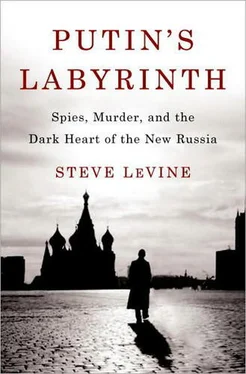These events in latter 1999—the apartment blasts and Putin’s retaliatory assault on breakaway Chechnya—“transformed the Russian political landscape,” wrote Paul Klebnikov, a Forbes magazine reporter. “Prime Minister Putin declared the nation besieged. Paranoia swept Russia’s cities….” The fearful populace craved a strong leader and six months later elected Putin president with 52.6 percent of the vote. The results were a stunning turnaround from his popularity rating of a mere 2 percent when, as a stranger to the population at large, he was first appointed prime minister.
While most of the country was galvanizing around Putin, some were troubled by an explosion that didn’t happen. On September 22, 1999, six days after the fourth blast, in Volgodonsk, nervous residents of an apartment building in the city of Ryazan became suspicious of strangers seen on the premises and called police, who found a bomb identical to the others and deactivated it.
Dogged local police work and reporting by Russian journalists turned up evidence that pointed away from Chechen involvement. One of the most tantalizing discoveries was a telephone call to FSB headquarters in Ryazan—tracked by a switchboard operator—that suggested contact between the security agency and someone involved in planting the bomb. Very quickly, the official story—that a terrorist attack had been thwarted—changed. Moscow now declared that the bomb was a dummy, placed in the apartment house as a civil defense exercise to test public vigilance. Local police, though, said it contained the working parts of a bomb, and tests indicated the presence of explosives.
In what became known as the Ryazan Incident, local and foreign reporters and opposition parliamentarians speculated that if the FSB itself wasn’t responsible for planting the bomb, then rogue agents or officers might have been. It wasn’t much of a leap to then suggest that similar elements in the FSB could have been behind the other apartment bombings.
It was a sensational scenario—that the deadly attacks had been staged by the FSB, acting on behalf of unidentified people with unknown motivations at senior levels of the government. Andrew Jack of the Financial Times bureau in Moscow took a skeptical view. He thought a likelier culprit was an affiliate of al-Qaeda in the neighboring region of Dagestan. But one of Jack’s predecessors, David Satter, was a chief proponent of the FSB theory. In Darkness at Dawn, Satter delivered a riveting analysis of the event in Ryazan, bolstered by witness testimony. Satter was convinced that “Ryazan was planned by the same people who perpetrated the earlier bombings.” He characterized the bombers as “those who needed another war capable of propelling Putin into the presidency in order to save their corruptly acquired wealth. These could only have been the leaders of the Yeltsin regime itself,” meaning the FSB.
Some who continued to question whether the government had played a role in the bombings were killed or imprisoned over the next several years. Opposition lawmaker Vladimir Golovlyov was shot dead while walking his dog. Gunshots killed Sergei Yushenkov, a leading liberal parliamentarian, near his home. Yuri Shchekochikhin, a Duma deputy and reporter for the opposition Russian newspaper Novaya Gazeta, died after a sixteen-day illness resembling poisoning. Lawyer Mikhail Trepashkin was jailed on a weapons charge just before he was to testify at a court hearing into the explosions. He maintained that the firearm in question had been planted, and upon his release a year later he renewed his accusations of government complicity in the explosions.
The mystery of the four apartment house explosions that preceded the Ryazan Incident attracted the attention of Russian billionaire oligarch Boris Berezovsky. He had played a crucial role in getting Putin elected president by lining up cash, political support, and, more important, unabashedly positive coverage on his television station, ORT. But the two had a falling-out soon after and the tycoon now lived in self-exile in the West.
One of his key advisers, Yuri Felshtinsky, believed that the FSB had been involved in the apartment blasts. He also suspected that Putin, who was chief of the agency up until a month before they happened, had taken part in the planning. Felshtinsky, a bearish Russian émigré, had spent years prowling Russian archives, specializing in cataloguing the diaries of Bolshevik revolutionary Leon Trotsky. He became bored with his historical pursuits, longed to move into contemporary political analysis, and signed on with Berezovsky.
In a meeting at his suburban Boston home, Felshtinsky explained to me that one day while riding in a limousine with his employer he took the opportunity to advance his theory about the explosions. He told Berezovsky that the motives were obvious: power and wealth. As the Yeltsin era drew to a close, the future control of Russia was up for grabs. If the men of the FSB had to kill three hundred people to create a climate of fear that would enable them to claim the spoils, well, they would kill three hundred people. It followed that the leader of the intelligence agency would be rewarded with the presidency because he had taken the greatest risk. That’s a mafia tradition—the person risking the most gets the most, Felshtinsky argued.
At first, Berezovsky was skeptical of Felshtinsky’s suspicions. But later, he began to reflect on the run-up to Putin’s election. As the struggle to succeed Yeltsin had begun to take shape, most observers viewed the taciturn prime minister as a relative unknown who stood little chance of political survival. Yet Putin had seemed highly confident, Berezovsky now recalled. In fact, the man had seemed to know something that he was keeping to himself.
“I am so stupid,” Berezovsky finally blurted out, according to Felshtinsky. “I am so stupid.”
Felshtinsky’s scenario was entirely believable, Berezovsky decided. Putin’s confidence that he would assume power could be explained by his knowledge of, or participation in, a plot that was unfolding within the FSB.
The oligarch now directed his attention to the particulars of the apartment house explosions. Who would know how such a terrorist plot might have been carried out and how to identify the likely culprits? Felshtinsky immediately thought of another Berezovsky adviser, a fellow named Alexander Litvinenko, who had served as an intelligence officer with some of the darkest units of the FSB. Litvinenko, already a pointed critic of the spy agency, was still living in Russia but would soon defect to the West.
At Berezovsky’s request, Felshtinsky flew to Moscow to test his theory with Litvinenko. They drove out together to the latter’s dacha outside Moscow, and strolled in the woods after leaving behind their cell phones—a standard precaution against possible electronic surveillance. Felshtinsky outlined his suspicions and posed the question: Was such a sequence of events possible?
Felshtinsky not only sounded reasonable, Litvinenko replied, but had hit upon a pattern.
“Find everything you can about Max Lazovsky,” Litvinenko suggested.
“Who?”
Lazovsky was a former KGB officer and reputed criminal leader. As Litvinenko and Felshtinsky would later describe in Blowing Up Russia, a book they would write together, Lazovsky had helped bomb a Moscow bridge, an act coinciding with Yeltsin’s 1996 reelection campaign, and was later arrested. In August 1999—a month before the apartment bombings—the Russian Supreme Court freed Lazovsky. Now he was dead—murdered eight months after the apartment explosions—and Litvinenko saw his fingerprints all over them. “If you understand Lazovsky, how he operated, how his organization was built, you will understand everything,” Felshtinsky recalls Litvinenko saying.
Читать дальше












